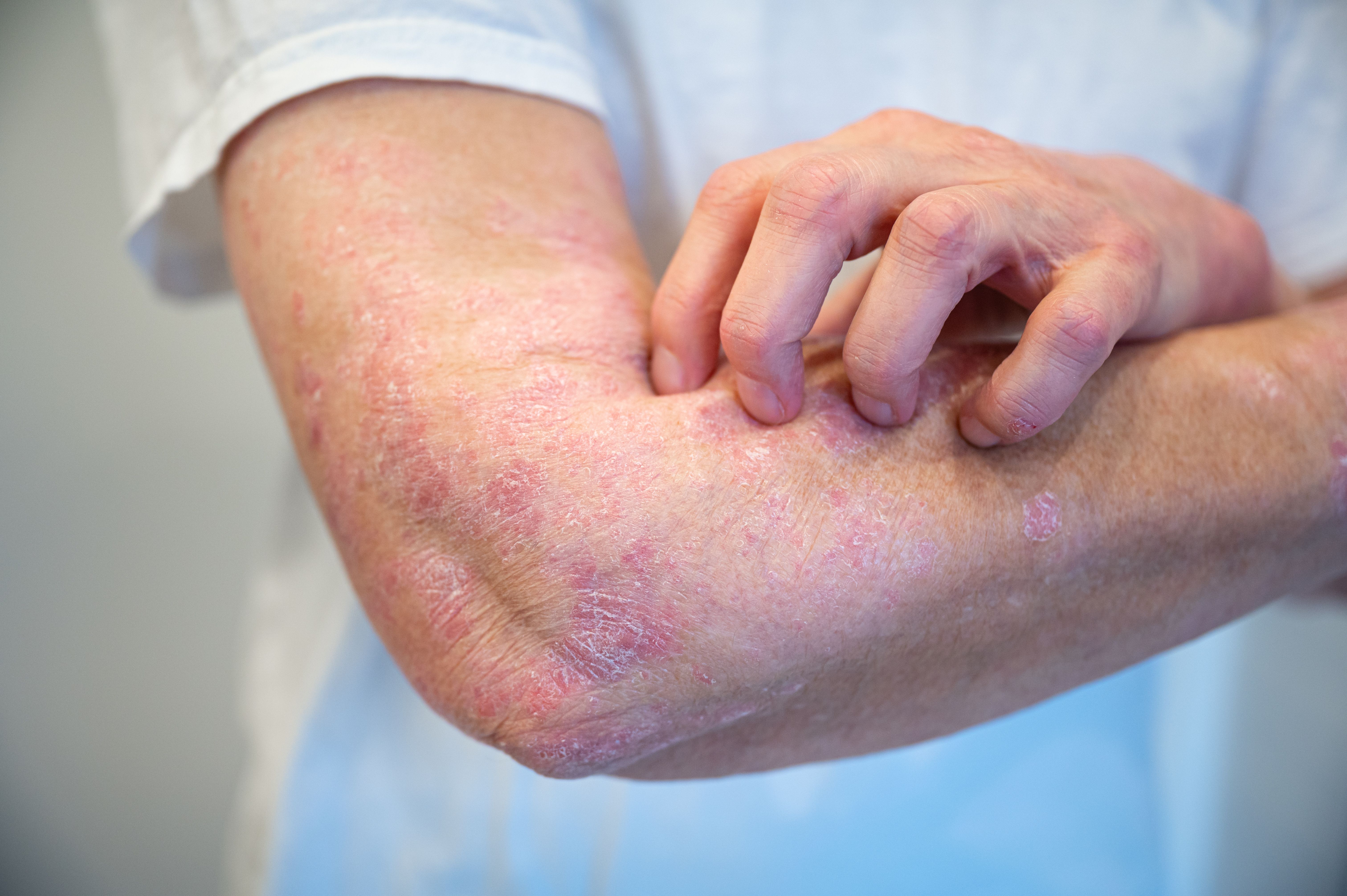- Acne
- Actinic Keratosis
- Aesthetics
- Alopecia
- Atopic Dermatitis
- Buy-and-Bill
- COVID-19
- Case-Based Roundtable
- Chronic Hand Eczema
- Chronic Spontaneous Urticaria
- Drug Watch
- Eczema
- General Dermatology
- Hidradenitis Suppurativa
- Melasma
- NP and PA
- Pediatric Dermatology
- Pigmentary Disorders
- Practice Management
- Precision Medicine and Biologics
- Prurigo Nodularis
- Psoriasis
- Psoriatic Arthritis
- Rare Disease
- Rosacea
- Skin Cancer
- Vitiligo
- Wound Care
News
Article
Bimekizumab Demonstrates Safety and Efficacy in Elderly Patients with Psoriasis
Author(s):
Key Takeaways
- Bimekizumab achieved high efficacy in older patients with plaque psoriasis, with over half experiencing complete skin clearance by week 16.
- The trial showed significant improvement in difficult-to-treat areas, with high clearance rates in the scalp, palmoplantar, genital, and nail regions.
The IL-17 inhibitor demonstrated biologic-level efficacy in moderate to severe plaque psoriasis.
Image Credit: © Daniel Beckemeier - stock.adobe.com

In a recent clinical trial, bimekizumab showed promising results for older patients with moderate to severe plaque psoriasis.1 Researchers found that bimekizumab achieved high efficacy in reducing symptoms, with more than half of patients experiencing complete skin clearance after 16 weeks of treatment. Additionally, the treatment demonstrated a favorable safety profile with no serious adverse events. The trial also showed high levels of skin clearance in difficult-to-treat areas, such as the scalp and genitals. Bimekizumab was approved in October 2023 as the first FDA-approved IL-17A and IL-17F inhibitor for adults with plaque psoriasis.2
The trial was conducted across 33 clinics in Italy from December 2022 to September 2023. Patients received two 160 mg injections of bimekizumab (for a total of 320 mg) every 4 weeks until week 16, then every 8 weeks thereafter. Participants were adults aged ≥65 years with moderate to severe plaque psoriasis and were candidates for systemic therapy. There were no exclusions in these criteria. A total of 98 patients were included in the study, with a mean age of 71.1 years; and 64 (65.3%) of the participants were men. Approximately half (53.0%) of participants had previously received biologic treatments while 46 (46.9%) were naïve to these.
The primary endpoint was the proportion of patients achieving a 75%, 90%, and 100% in Psoriasis Area and Severity Index (PASI 75, 90, and 100) score when compared with baseline scores at weeks 4, 16, and 36. Secondary endpoints were the proportion of patients achieving a Psoriasis Global Assessment (PGA) score of clear (0) or almost clear (1) at specific sites (scalp, palmoplantar, genital, nail).
At baseline, the mean PASI score was 16.6 ± 9.4. After 4 weeks of the bimekizumab treatment, the score significantly decreased to 4.3 ± 5.2. There was a further decrease to 1.1 ± 1.7 after week 16. Overall, this level of improvement was maintained, but not further increased, after 36 weeks. PASI ≤2 was recorded in 36 (36.7%) patients at week 4, and 68 (69.4%) patients at weeks 16 and 36. By week 16, 86/98 (87.8%) patients reached PASI75, 71/98 (72.4%) obtained PASI90, and 52/98 (53.1%) PASI100. Furthermore, binary logistic regression showed no association of baseline PASI, age, gender, or previously naïve state when reaching PASI100 by week 16 or week 36.
Complete clearance at week 4 and beyond was achieved among the following difficult-to-treat areas:
- Scalp: 77.6% at week 4, 93.9% at week 36
- Palmoplantar: 78.6% at week 4, 88.8% at week 36
- Genital: 89.8% at week 4, 99.0% at week 36
- Nail: 75.5% at week 4, 81.6% at week 36
In terms of safety, 5 participants (5.1%) reported adverse events. Two patients were treated for mild eczema and 3 patients were treated for oral candidiasis. Bimekizumab therapy did not need to be ceased. The researchers acknowledged some limitations, such as the short follow-up period and the observational retrospective design. Despite these limitations, the researchers believe the study highlights the potential of bimekizumab in achieving biologic-level efficacy with complete skin clearance after 16 weeks of treatment.
“Elders [older patients] are a relevant proportion of patients with plaque psoriasis in clinical practice,” the authors wrote. “Therefore, data from observational studies are an important source of evidence to guide for therapeutic choices in this population with special tolerability and efficacy issues.”
References
1. Orsini D, Megna M, Assorgi C, et al. Efficacy and Safety of bimekizumab in elderly patients: real-world multicenter retrospective study - IL PSO (Italian Landscape Psoriasis). J Dermatolog Treat. 2024;35(1):2393376. doi:10.1080/09546634.2024.2393376
2. BIMZELX approved by the U.S. FDA for the treatment of adults with moderate to severe plaque psoriasis. UCB. October 18, 2023. Accessed June 29, 2024. https://www.ucb.com/stories-media/Press-Releases/article/BIMZELXR-Approved-by-the-US-FDA-for-the-Treatment-of-Adults-with-Moderate-to-Severe-Plaque-Psoriasis
Newsletter
Like what you’re reading? Subscribe to Dermatology Times for weekly updates on therapies, innovations, and real-world practice tips.







